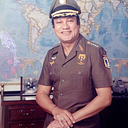Interview with Morley Safer for 60 Minutes, 1997
General Noriega is America’s only official prisoner of war.
Following the Dec. 20, 1989 U.S. military invasion of Panama, ostensibly to serve an arrest warrant on the Panamanian head of state, based on bogus drug-trafficking charges, Noriega was taken to the U.S. and tried in federal court in Miami, Florida and convicted. He was officially classed by the court as a prisoner of war, and, he is, to this day, allowed to wear his Panamanian Defense Forces uniform, as he serves a 40-year sentence, and awaits the next phase of his appeal.
On March 9, 1997, CBS News’s “Sixty Minutes” aired a 12-minute interview with General Noriega, on the occasion of the publication of his autobiography, The Memoirs of Manuel Noriega, America’s Prisoner (with Peter Eisner, New York: Random House, 1997).
In the interview, Noriega identified the real reason that he was targetted by George Herbert Walker Bush: On two occasions, he had dared to say “no” to Bush emissaries.
The first occasion involved his decision to shut down the School of the Americas, a military counterin surgency training center in Panama run by the Pentagon.
The second instance involved the Nicaraguan Contras.
From the broadcast:
Morley Safer: “Noriega says Oliver North,working with Adm. John Poindexter, President Reagan’s national security adviser, tried to get Noriega to help in a secret war against the Sandinistas in Nicaragua and the rebels in EI Salvador.”
Manuel Noriega: “The second ‘no’ was Poindexter; when Poindexter was saying, ‘We need Panama as a spear head against Nicaragua.’ So that the United States can go ahead and carry out an invasion. But Noriega said, ‘no.’ Now I became unfriendly. Now, I was considered ugly.”
Safer: “Peter Eisner is Noriega’s co-author.He says he has little doubt that the campaign against Noriega had little basis in solid fact.Washington leaked stories about his drug deals, stories with very little foundation…. The campaign of vilification, says Noriega, was bought, hook, line, and sinker, by the opposition press in Panama, and by American reporters. The conspiracy, he said, became the obsession of one man.”
Noriega: “George Herbert Bush.”
Safer: “In early ’88, a 30-page drug indictment was drawn up. It took 25,000 troops and Stealth bombers to bring Noriega to trial.”
Safer then presented some startling evidence: that it was actually Bush and the U.S.Department of Justice-not No riega-who were caught in bed with the Cali, Colombia drug cartel.
Safer: “Carlos Lehder, the drug kingpin who’d never met Noriega, testified against him, and.his sentence was reduced. More than half the witnesses were convicted felons. The gov ernment’s so-called dynamite witness was a trafficker named Ricardo Bilonick, who simply gave himself up and offered to testify …. Frank Rubino, Noriega’s lead attorney, says Bilonick was so important to the case that the government made a real sweetheart deal with him. Instead of facing 20 years, he did 24 months…. But there was more. If Bilonick testified against Noriega, the U.S. government would reduce the sentence of one Luis Santa Cruz Echevery, a convicted trafficker and half-brother of a member of the Cali Cartel. But what was in it for Bilonick to give up his freedom in Panama?” Frank Rubino: “Ricardo Bilonick was paid by the Cali Cartel, $1,250,000, to testify against General Noriega, and was also told that he basically had one of two choices: He could collect the million-and-a-quarter, he could come and testify, or he could be buried here.”
Safer: “So, in effect, a cynic would say that the U.S. Justice Department and the Cali Cartel were in cahoots to nail Noriega.”
Peter Eisner: “Not only a cynic, but the lawyer for the Cali Cartel said-wrote in a letter-that we must keep this quiet.”
Safer: “Because, the letter to the U.S.Justice Department went on to say, ‘the appearance will be that you have made a deal with the Cali Cartel.’ “
